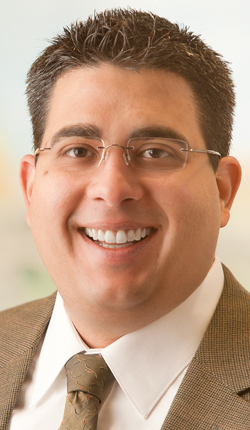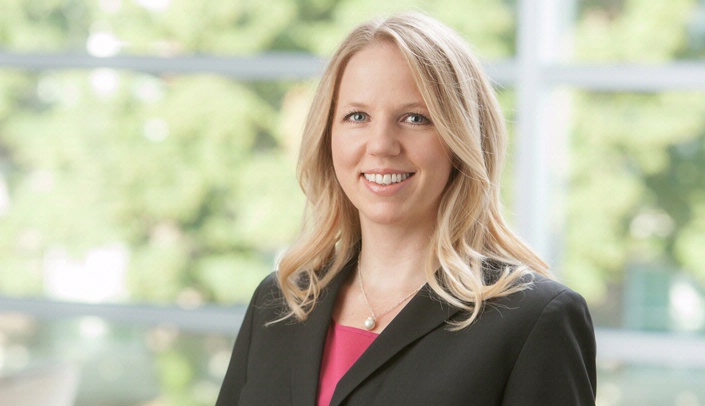The Huntington’s Disease Society of America has designated UNMC/Nebraska Medicine as one of its 29 Centers of Excellence.
 |
Diego Torres-Russotto, M.D. |
“This is exciting news for our program,” said Amy Hellman, M.D., director of the UNMC/Nebraska Medicine Huntington’s Disease Center and assistant professor, department of neurological sciences.
“Huntington’s disease care really involves a multidisciplinary team,” she said. “We work very closely with psychiatry, neuropsychology, genetics, dietetics and nutrition, as well as physical, occupational and speech therapy. It’s a testimony to the quality of our team.”
Dr. Hellman noted that 42 centers applied to HDSA to be considered as a center of excellence.
“It’s a very competitive process,” she said. “We are in good company with some of the best medical centers in the country.”
Among other centers recognized as centers of excellence were Johns Hopkins University, Stanford University, Cleveland Clinic and Duke University.
Huntington’s disease is an incurable, genetically transmitted degenerative disease of the nervous system that affects movement, thinking, and some aspects of personality.
It’s estimated that about 30,000 people in the United States have Huntington’s disease, including between 120-180 patients in Nebraska.
The UNMC/Nebraska Medicine Huntington’s Disease Center draws patients regionally from western Iowa, South Dakota, Kansas and Wyoming.
About HDSA
The Huntington’s Disease Society of America is the largest non-profit volunteer organization dedicated to improving the lives of everyone affected by Huntington’s disease. Founded in 1968 by Marjorie Guthrie, wife of folk legend Woody Guthrie who lost his battle with HD, the society works to provide the family services, education, advocacy and research for people diagnosed with HD in the United States.
HDSA supports and participates in the HD Drug Research Pipeline, which develops potential therapies to treat and eventually cure HD. The society comprises 46 local chapters and affiliates across the country with its headquarters in New York City.
Additionally, HDSA hosts more than 190 support groups for people with HD, their families, caregivers and people at-risk, and is a resource on Huntington’s disease for medical professionals and the general public.
“Huntington’s disease is a challenge,” Dr. Hellman said. “But this challenge can bring out the best in a lot of people who create a culture of hope, support and community among families affected.”
Gaining the Center of Excellence designation from HDSA is the realization of a goal established nearly a decade ago by John Gollan, M.D., Ph.D., who was then dean of the UNMC College of Medicine. Dr. Gollan died earlier this year.
“Dr. Gollan shared our passion for Huntington’s disease care and encouraged us to seek the center of excellence designation,” said Diego Torres-Russotto, M.D., an associate professor of neurological sciences and director of the Movement Disorders Program. “In a way, this designation is a tribute to him. He would be extremely proud that we received it.”
For UNMC/Nebraska Medicine to be an HDSA Center of Excellence will allow patients access to the latest clinical trials and study groups.
“We know that gene that goes awry to cause Huntington’s disease,” Dr. Torres-Russotto said. “We are getting closer to finding an answer. I’m confident that we will find a cure in my lifetime.”

My husband and I are elated to hear the news of Nebraska Medicine becoming a HDSA Center of Excellence as my husband suffers from this complex and horrible disease.
Greg and I are so appreciative of all of the personal hard work, dedication and efforts of Dr. Torres in order to meet this goal for the people suffering from HD in Nebraska and other surrounding communities. Thanks also to all of the other Neurology staff who helped in accomplishing this designation for Huntington's Disease.
Nebraska Medicine shows deep compassion for all who suffer from this disease.
As a caretaker, it is very reassuring to know that my husband has the best medical care possible. We have a tough road ahead of us, but with these doctors, these clinics and this hospital behind us, we know we will prevail.
It's a great pity that the UK has no such facilities, in fact GPs have mostly never even heard of it. My mother suffered from it before the gene was discovered, but there was no hint of it being hereditary, no one knew what it was everyone suffered.